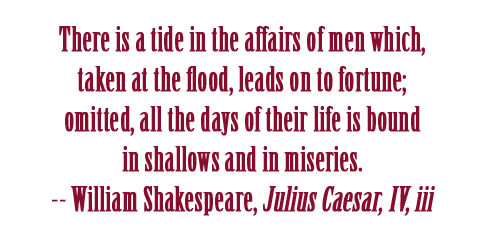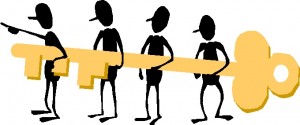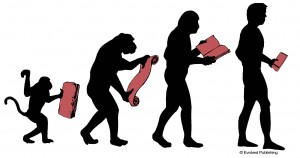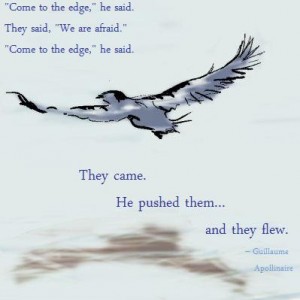Another guy with an opinion about this crazy industry. Yeesh!
[Revised/Reposted from original May 2, 2012 post at www.EvolvedPub.com]
As Publisher and Executive Editor at Evolved Publishing (linked above), I’m regularly asked by folks to weigh in on the state of our industry, so here goes. (Fair warning: you might want take that BRB and freshen up that cup of coffee before you continue.)
 I spend a lot of time gazing into my crystal ball, opaque though it may be, to figure out what the future holds for us small fries trying to find our way in the mighty, mighty world of publishing. I’ve been doing that since long before my partner D.T. Conklin and I decided to open up shop as Evolved Publishing. Now, I must keep my finger on the pulse not just for myself, but for the fine and talented authors, editors, and artists who’ve joined our team – 15 authors, 7 editors, 7 artists, and more coming soon in every category. It’s early in our collective effort, but the train is gathering steam.
I spend a lot of time gazing into my crystal ball, opaque though it may be, to figure out what the future holds for us small fries trying to find our way in the mighty, mighty world of publishing. I’ve been doing that since long before my partner D.T. Conklin and I decided to open up shop as Evolved Publishing. Now, I must keep my finger on the pulse not just for myself, but for the fine and talented authors, editors, and artists who’ve joined our team – 15 authors, 7 editors, 7 artists, and more coming soon in every category. It’s early in our collective effort, but the train is gathering steam.
We offer an alternative to both traditional publishing, often referred to as The Big 6, and the self-publishing option – we offer a hybrid small press model. Since getting picked up by The Big 6 (assuming you would even want to given the current market dynamics) is akin to winning the lottery, I’m going to skip right past them and talk about the “indie” options: self-publishing, or a small press like us.
Self-publishing enjoyed a boost in credibility after the eBook revolution made it easier, even financially attractive, to self-publish rather than pursue traditional methods. Some reputable authors chose the self-pub route with fair success, and soon everyone followed suit. No… really… I mean everyone. Based on the 8.2 trillion blogs to which I subscribe, the comments left there, the social media buzz, and the latest gossip from my neighbor’s poodle, there are now approximately 4.3 billion self-published authors. Okay, maybe it only seems that way.
 This David versus Goliath picture does not, as you might expect, represent us (upstart small press publisher) versus them (The Big 6). In fact, I intended it to represent them (self-pubbers) versus them (self-pubbers). Yep, individually, a self-pubber is the underdog, David. Collectively, they are the brute, Goliath.
This David versus Goliath picture does not, as you might expect, represent us (upstart small press publisher) versus them (The Big 6). In fact, I intended it to represent them (self-pubbers) versus them (self-pubbers). Yep, individually, a self-pubber is the underdog, David. Collectively, they are the brute, Goliath.
As thousands upon thousands of self-pubbers flood the book markets with a tsunami of new material, authors and readers alike are shaking their heads and wondering, “What the devil is going on here?”
I’ll confess to something of a love/hate relationship with self-pubbers. I love their entrepreneurial spirit (for those who actually treat it like a business, which it is), their willingness to say, “Go spit!” to the train wreck that is traditional publishing (Hey, this is just me editorializing.), their daring attempt to walk the tightrope from which 99% plummet to their deaths. Yet I hate that such a high percentage of self-pubbers give short shrift to their profession, and publish substandard work.
I particularly love the self-pubbers who do it right: professional editing, professional covers, professional websites, professional self-promotion and marketing. Are you noticing a theme here? Unfortunately, even the professionals, given their self-publishing label, must suffer under the reputation driven mainly by the non-professionals. The early pioneers, and the traditional mid-listers who made the jump, have been able to defeat that reputation to some extent. The John Q. Nobodys lost in the sea of fellow John Q. Nobodys, however, have had less than stellar luck at combating the label.
Indeed, one of the reasons we formed Evolved Publishing in the first place, with an unwavering insistence that Job One = Quality, was that we didn’t want to be lumped in with people taking shortcuts. And let’s face it: a significant percentage of self-pubbers take shortcuts, and the people they probably hurt the most – aside from their selves, of course – are the self-pubbers doing it the right way… professionally.
Well, technically savvy book consumers are starting to figure all this out. They’re getting burned too often by $2.99 offerings, $0.99 offerings, even FREE offerings, and they’re getting frustrated. Yet what is an indie author to do?
The Fads
Well, we’ve learned a bunch in the past year, not the least of which is that last quarter’s brilliant idea is this quarter’s old news – and next quarter’s Dodo Bird.
It has always struck me as ironic that in an industry driven by highly creative individuals, the business aspect of the industry is one giant exercise in, “Hey, let’s do what that guy did.” Someone finds something that works, and then thousands – nay, tens of thousands – of people rush in to do the exact same thing.
We saw it with social media: Want to be a successful author? No worries. Just build a strong social platform and you’ll sell thousands of books.
We saw it with $0.99 pricing: Want to establish yourself as a mover and shaker in this marketplace? No worries. Just price your books at $0.99 and watch your career soar.
We saw it with Amazon’s KDP Select Free Days: Want to develop momentum for your book, and then sell thousands of copies afterward? No worries. Just put your book up for free for a day or two or five, and then watch your paid sales go through the roof. This is the newest fad, of course, and it started fading just four months in.
All of those tools remain viable components in our toolbox, but they no longer provide the “instant sure thing” they once did for some. Indeed, we’re now seeing that today’s big idea fizzles within a few months, overwhelmed by the rush of thousands of people chasing the same pot of gold, only to find that when they finally pursue the end of that rainbow, the sun has set.
Today’s ingenious marketing idea becomes little more than a fad. And fast.
Back to the Basics
Some things become increasingly clear every day:
- Quality Catalog: that simple concept drives the train. Without it, indie authors are sunk.
- Fads come and go, offering only short-term opportunities, but business fundamentals are forever.
- No one strikes it big with one book. Few do it with two books. It’s a long road. This business we call writing is a slow grind – always has been – and it requires hard work, determination, and more than a little perseverance.
- Quality Matters: this should be first, second and third on everyone’s list. Staying power requires an absolute commitment to quality.
We all got caught-up in the excitement of the eBook Revolution. We saw numbers by the early pioneers and thought, “Man, I want a piece of that!” Now, that excitement is winding down, people are coming back to reality, and the marketplace is reasserting itself.
Are there sufficient consumers to support 50,000 new authors? No. At least, not if we mean by “support” that authors earn a comfortable living as authors, or even a reasonable part-time income sufficient to the work that goes into it. Already, self-pubbers are seeing their sales numbers dwindle, and are increasingly complaining that they’re losing money, falling back into the old “Vanity Publishing” mode. Even some of the “stars” are experiencing declines of 40-50% during the most recent few months. Yes, summer is a bad season for books sales, but it’s more than that.
Indeed, even long-established pros have suffered the effects, dragged down by the entire market dynamic. The difference for them, of course, is their reputation, ready-made audience, and a staying power self-pubbers don’t have. As more consumers run away from self-pubbers, those old pros will be the first to benefit.
What does it all mean, and how do we counter it?
Frankly, we counter it by doing what we do, and by grinding it out for the long haul. We counter it by becoming those old pros.
Surviving the Mad Rush
The eBook Revolution encouraged a mad rush into the marketplace by newcomers. Hey, now it was easy and cheap – really cheap for those willing to compromise on quality, meaning the majority. The result? Writers first dumped hundreds, then thousands, then tens of thousands of substandard books into the marketplace, competing for a far-too-finite number of customers, selling for $2.99, then $0.99, and ultimately free, all in a desperate attempt to be that which they always dreamed of becoming: an author.
Yet those who succeed as authors have always been few – the true professionals producing high quality work – and despite the initial excitement of the eBook revolution, this will be true again.
If we are to be successful authors, we must continue to separate ourselves by providing books that aspire to and reach high professional standards. We must continue to write, each producing at least one book per year (two should be your goal, if you plan to do this for a living). We must continue to hone our craft, to learn, to keep our finger on the pulse of the industry we hope will support us. We must be professionals.
Reasonable Expectations
Part of that mad rush, of course, was the expectation that we were all immediately going to start selling thousands of books, making a mint, living the good life as authors. Well, now that we’ve all been dealt a dose of reality, we have an opportunity to take a deep breath, re-examine what we’re doing, and plan for the next positive steps.
Authors who make (net) even $5,000 their first year as authors are rarer than you might like to believe; nonetheless, it’s true even in the traditional publishing industry.
Most authors kick into second gear starting in year two, and then build speed through year three and beyond. This assumes, of course, that said author continues to produce good work. This is nothing new; it’s always been that way. The problem, if we may call it a problem, is that so many thought the eBook Revolution would change that, and bring us our riches more quickly.
Not so. It remains a “process.”
That’s one of the toughest things for writers to settle on: to stop worrying about what book one is doing, and get about the business of writing book two. Then, stop worrying about what book two is doing, and get about the business of writing book three. And so on.
In this age of instant gratification, and where most of us are accustomed to punching a clock or working on a regular salary, knowing precisely what’s coming in the next paycheck, it’s a hard thing to say, “Never mind that. Just get back to work.”
Yet history tells us that until you get book three to market, with each of the three a quality product, you’re probably not going to make a living as a writer. Even then, if you must fight to establish your reputation because of who’s publishing (or not publishing) your books, the odds are against you. It also tells us that when you hit that stride, achieving your “overnight” success, the whole of your catalog will rise at once. In other words, if book three or four is your magic bullet, books one and two will also sell better from that point on. The rising tide carries all boats.
So don’t obsess over the fact that you’re only selling a copy or two a day (or less) of your first book. Obsess over completing your second book, and then your third book, and so on. And those numbers will rise. It’s not magic. It’s just the business.
Investing in Your Field
I tread into this section with a warning: it may sound a bit preachy. Please bear with me.
As authors, we are all businesspeople. There’s no escaping that fact, so we must embrace it. That doesn’t mean you need to invest many thousands of dollars to get your career rolling. Indeed, I have my doubts about the potential payback of huge investments, if they don’t get you to your ultimate goal: quality catalog. No business survives for long that invests $2 in order to gross $1.
However, there are things we can all do that will make a difference in the end, and we should do some of those things sooner rather than later – a quality website, for example, with a blog that offers interesting, funny, poignant, or informative content (all of the above is a dream come true). Do you need a bunch of bells and whistles? Well, that would be nice, but so long as it’s functional, clean and professional, it’ll do. If you can do more, you should.
Learn your craft. This is a profession, like so many others, that requires a continuing education. The moment you stop growing as an author, you start dying as an author. I’ve been studying this crazy craft for 35 years, and every time I learn something new, I realize I have much more to learn. Read about writing; not only for the instruction, but for the motivation. I’ve read some 90 books on the subject, and untold thousands of articles, and any time I feel I’m slipping into a rut, I search for another piece to help pull me out of it. I love these books for the way they re-energize me and kick me in the keester.
My only advice here is that you choose your sources carefully. Just because someone has published a book (let’s face it; anyone can do that nowadays), doesn’t mean they’re an expert. Follow recommendations and trusted sources. Of the thousands of blogs out there, for example, many are valuable, many are confused, and many are just plain wrong. You would do well to start at a place like Writer’s Digest Books. I could also make any number of recommendations, as I do right here at this website (lower right margin of Home page).
Read your genre, of course, but reach beyond that. Stretch your wings and fly through some other genres. Don’t skip the classics. You’ll learn a lot.
There! That wasn’t too preachy, was it? I just wanted to emphasize here that part of being a professional businessperson is keeping your finger on the pulse of your industry, and being an expert in your field. Doctors do it. Lawyers do it. Accountants do it. Well… you’re an Author, so just do it.
The Long Road
The market is undergoing some rather severe adjustments. Frankly, many self-published authors are feeling the terrible squeeze. How do I know? Well, lots of them are blogging and commenting about it, of course, but more than that, several of them have recently inquired about joining Evolved Publishing.
Indeed, we’ve temporarily closed to submissions because we’re growing so fast that we need time to catch up, organizationally. (NOTE: We’ll likely start accepting submissions again in mid-October.) Will all those authors be great fits for us? No, but a few will, and new authors are inquiring with far greater frequency nowadays – most of them the aforementioned previously self-published. Indeed, three of our four most recent author additions fit into that category, and it’s likely that a high percentage of our next several additions will, too.
It’s not surprising, really; after all, we formed Evolved Publishing precisely because we dreaded going down that self-publishing road, fearing where it would lead.
We must all be realistic about the hard work, dedication, and patience required to succeed in this business. Historically, 94% of “published” authors fail and drop out (or resume their day job), and 99.8% of “self-published” authors fail. Even in the face of that, and although it’s impossible to provide guarantees in this business, I remain guardedly optimistic. The marketplace is trying to sort itself out right now, suffering the shock of that tsunami of new authors and books. Over the next year or two, it will find its equilibrium, and authors who’ve developed a strong reputation for quality work, and built their catalog, will be poised to prosper where others fail.
More self-publishers will be dying off over the next couple years, as they fail to make any money, and decide that being a Vanity Publisher isn’t worth the time, energy, money, or heartbreak. I say that not with glee, for I wish sad tidings for no one. I say it merely to indicate what’s happening in the marketplace.
The technological bubble that is the eBook Revolution is about to burst, because, like all economic bubbles before it, it grew too fast, too big, too out of control, and with no regard for natural market forces. It’s already starting. That’s not to say there won’t continue to be excellent opportunities for those who survive. Indeed, I think there will be fantastic opportunities.
First, however, the market must shake off the rapid excesses that have formed. Then consumers will do what they’ve always done: they’ll find the true values, “value” being a variable ratio of quality-to-price (Value = Quality:Price).
Want to survive and prosper on this long road? Then give book buyers the value they demand for their hard-earned entertainment dollars.
We at Evolved Publishing happen to believe that a well-coordinated team is likely to give us a better chance at success than trying to go it on our own. However, even if you choose to be that bold, daring entrepreneur blazing your own trail, just keep your eye on the prize, and remember that you must be the one thing too many in this business fail to be: professional. Then… write! And write some more. And never, NEVER compromise on quality.
~~~~~~~~~~














Please follow me here: